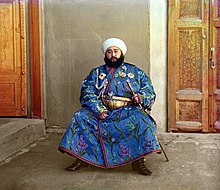Alim Khan
Seyyid Mir Mohammed Alim Khan ( Persian امیر عالم خان, Uzbek Said Mir Muhammad Amirhon ; * January 3, 1880 ; † April 28, 1944 in Kabul ) was the last emir of the Emirate of Bukhara until his expulsion by the Bolsheviks in 1920 .
Life
The offspring of the Mangite dynasty, which dates back to 1784, married his cousin, the daughter of Seyyid Akram Khan, in April 1902 and had two sons with her (Seyyid Mir Ibrahim Khan and Seyyid Mir Sultan Khan). Alim Khan died in exile in Afghanistan in 1944.
With the expulsion of Alim Khan in 1920, the emirate became an independent Soviet People's Republic of Bukhara with Samarkand as its capital, before it was integrated into the Soviet Union Republic of Uzbekistan in 1925 . In the east of the country the overthrown emir had gathered fighters against the Soviet Union with British help , but was driven back to Afghanistan by the Red Army in early 1921. At the end of 1921 his followers crossed the border again and allied themselves with the Basmati and Enver Pascha . Enver, appointed by Alim-Khan as "Commander in Chief of the Armed Forces of Islam and Governor of the Emir of Bukhara", actually conquered Dushanbe and occupied all of eastern Bukhara ( Tajikistan ), but was defeated by the Soviets in the summer of 1922.
literature
- Seyyid-Mir Mohammed Alim Khan (January 3, 1880– April 28, 1944). In: Jonathan D. Smele: Historical Dictionary of the Russian Civil Wars 1916–1926. Rowman & Littlefield, Lanham 2015, ISBN 978-1-4422-5281-3 , p. 974 .
Web links
| personal data | |
|---|---|
| SURNAME | Alim Khan |
| ALTERNATIVE NAMES | Alim Khan, Seyyid Mir Mohammed; Said Mir Muhammad Amirhon |
| BRIEF DESCRIPTION | Emir (Bukhara) |
| DATE OF BIRTH | January 3, 1880 |
| DATE OF DEATH | April 28, 1944 |
| Place of death | Kabul |
